Top 11 Moz Pro Alternatives & Competitors in 2024
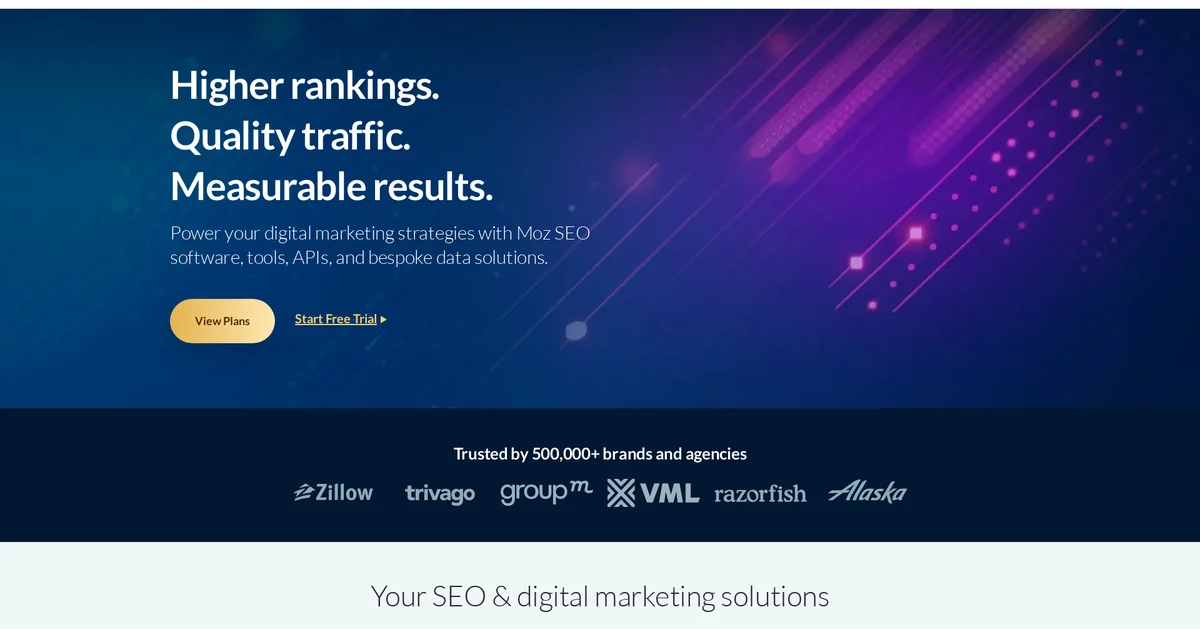
Here’s how SEO powerhouse Moz Pro has earned its reputation among digital marketers and businesses. Their platform serves over 500,000 brands and agencies, delivering the essential tools needed to boost search rankings and drive qualified traffic. From campaign execution to rank tracking and SERP analysis, their comprehensive toolkit helps teams navigate the complexities of modern SEO. Many marketing professionals rely on Moz as their daily command center for search optimization.
Beyond the core Moz Pro platform, specialized tools like Moz Local give multi-location businesses control over their digital footprint and review management. The system streamlines business listing updates and reputation monitoring across locations. Their developer-friendly APIs enable custom integration options, letting teams build specialized applications around Moz data. This combination of robust capabilities and intuitive design has secured Moz’s place as an industry standard - equally valuable to SEO beginners and veterans who need reliable data and insights.
While Moz Pro is a great product, it’s always good to shop around and look for alternatives. This article identifies some top competitors and their pros and cons.
Ahrefs
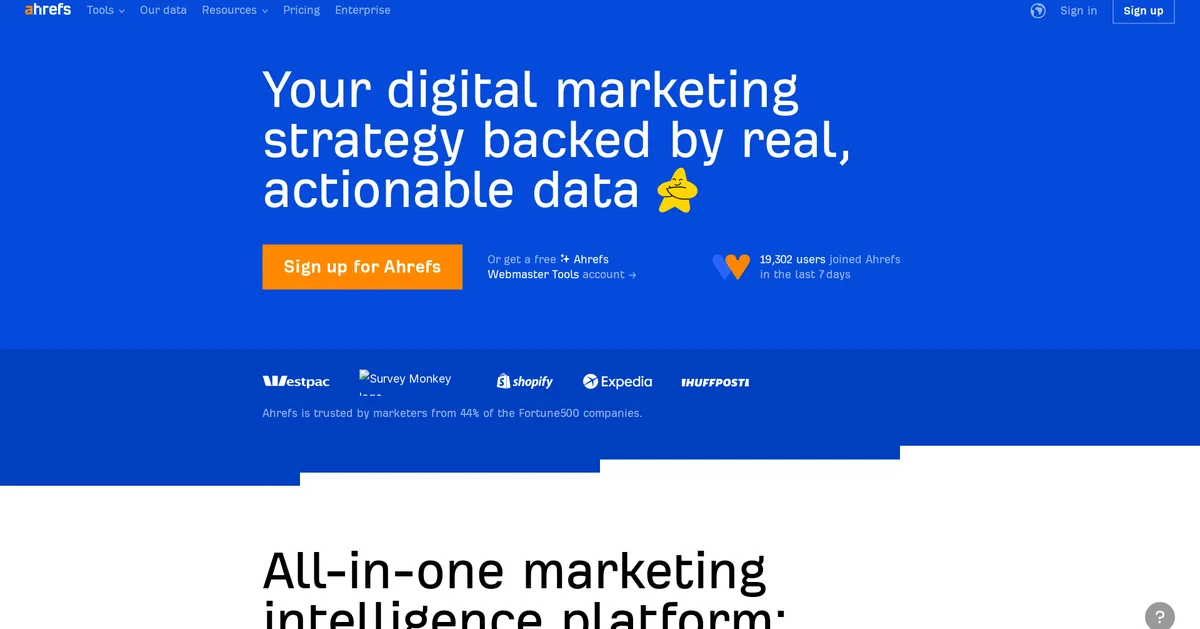
Ahrefs stands as a key player in SEO tools, known particularly for its data-driven approach to digital marketing. Since 2011, the platform has earned recognition through its massive database and precise analytics. Running the world’s 12th most active web crawler gives users deep visibility into both their own sites and competitor landscapes. This commitment to accurate, comprehensive data has helped establish their market position.
Site Explorer remains their flagship feature, delivering competitive intelligence through detailed website analysis and backlink tracking. The Keywords Explorer tool helps uncover search trends and opportunities that drive real business growth. Their Site Audit capabilities round out the core offering by identifying technical SEO issues that impact performance.
Recent additions include AI-powered features like the Content Grader that streamlines content optimization workflows. The platform benefits from an engaged user base and responsive support team, creating an environment where marketers can learn and solve problems efficiently.
Major enterprises make up a significant portion of Ahrefs’ client base, with nearly half of Fortune 500 companies using the platform. The tool appeals particularly to data-focused marketers who need actionable insights rather than surface-level metrics. This emphasis on measurable results has helped cement their position in enterprise SEO.
Pros
- Deep competitive analysis through Site Explorer
- Comprehensive backlink and keyword data
- Advanced AI content optimization
- Active user community
Cons
- Steeper learning curve for new users
- Premium pricing structure
- Feature set may exceed basic needs
SEMrush
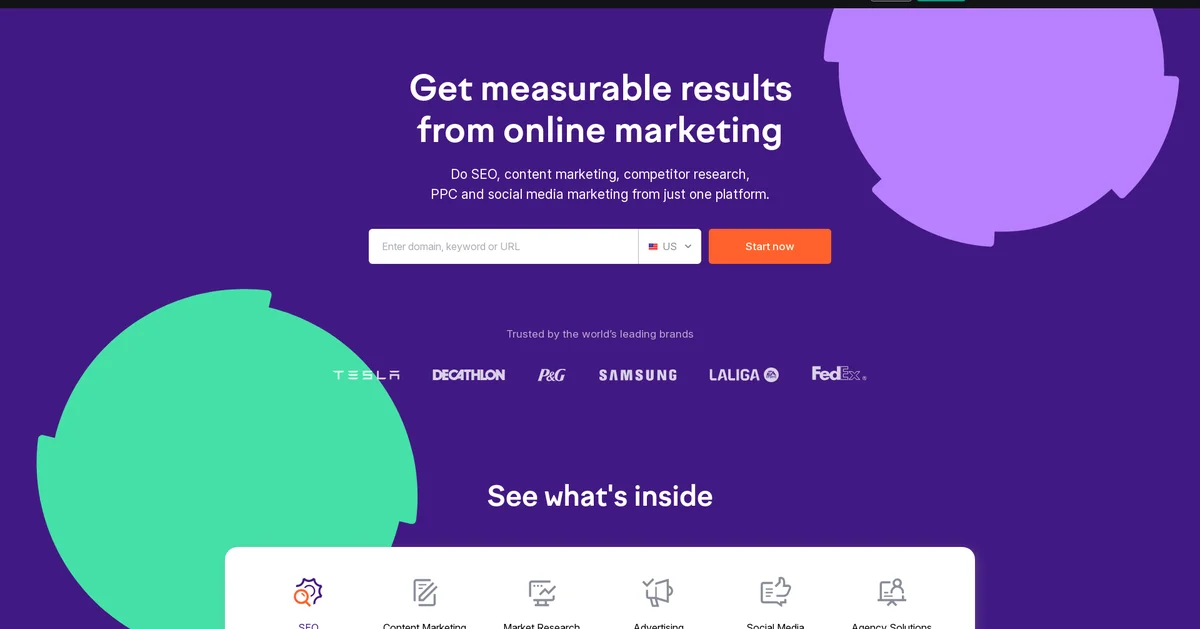
SEMrush has evolved into a powerhouse marketing platform since its 2008 launch, offering tools for SEO, content marketing, paid advertising, and social media management. The platform stands out for its massive keyword database and detailed analytics capabilities. From small businesses to major corporations, organizations rely on SEMrush to track and improve their digital marketing performance.
Marketing teams appreciate SEMrush’s robust competitive intelligence features. The platform reveals valuable insights about competitor traffic patterns, marketing approaches, and advertising strategies. These competitive analysis tools, combined with a comprehensive SEO toolkit for keyword research, backlink monitoring, and technical audits, give marketing teams practical ways to boost organic search visibility.
The platform takes a practical approach to content optimization. Rather than assuming users have deep SEO knowledge, SEMrush provides clear recommendations and AI-powered suggestions to help create search-optimized content. This makes advanced SEO techniques accessible to marketing professionals at any experience level.
Marketing agencies benefit from specialized features designed for client work. The platform includes automated reporting tools and white-label capabilities that streamline agency operations. These agency-focused solutions offer advantages over alternatives like Moz Pro, particularly for teams managing multiple client accounts.
Pros
- Rich keyword data across 130 geographic markets
- Deep competitive analysis capabilities
- Smart content optimization tools with AI assistance
- Unified platform for diverse marketing needs
- Agency-friendly features and workflow options
Cons
- Feature complexity can challenge new users
- Premium pricing compared to basic SEO platforms
Screaming Frog
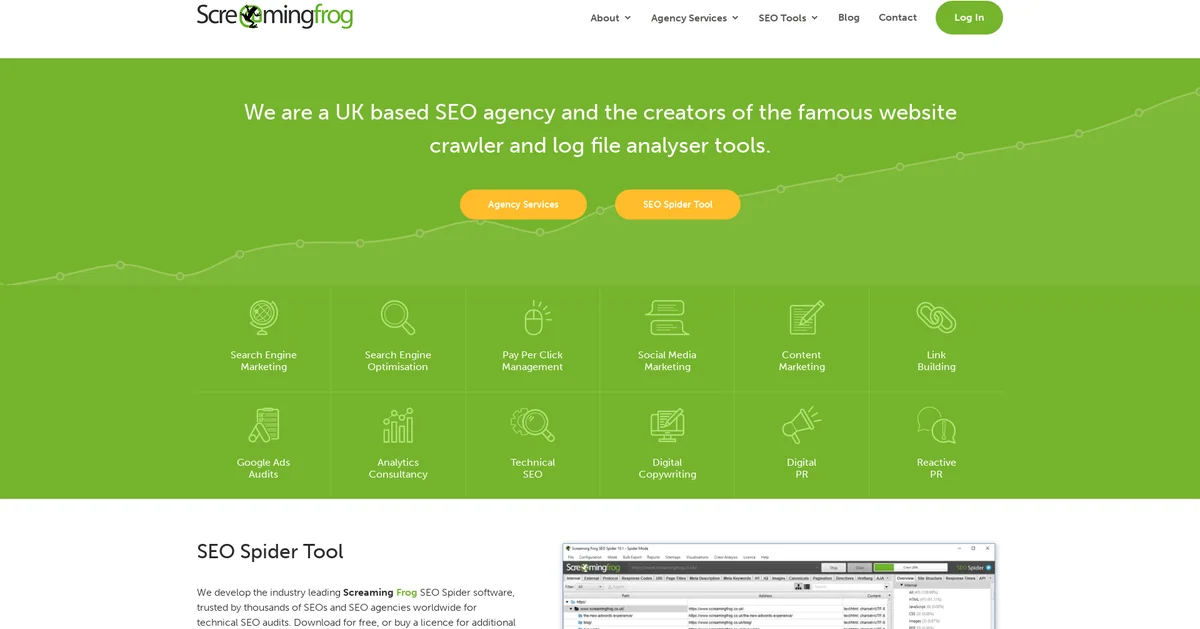
Screaming Frog emerged from the UK SEO scene and quickly gained recognition for their specialized SEO Spider Tool. The agency carved out its niche by delivering thorough technical SEO audits that benefit major corporations and growing businesses alike. Their approach combines deep technical knowledge with smart optimization strategies, helping clients navigate the complexities of search engine marketing.
The key difference between Screaming Frog and Moz Pro lies in their website crawling methodology. The SEO Spider Tool stands out for detecting technical problems, performing comprehensive site audits, and analyzing server logs. Many professionals value its robust functionality paired with straightforward operation, generating actionable data to improve SEO performance. While Moz takes a broader approach to SEO tools, Screaming Frog excels in detailed technical analysis, attracting users who need deep site performance insights.
The platform offers adaptable licensing structures to suit different needs. Beginners and budget-conscious users can start with the free version’s core features. As SEO requirements grow more sophisticated, upgrading to a paid license unlocks the full suite of advanced tools.
The decision between these platforms often depends on specific project requirements. Teams that need comprehensive technical auditing capabilities tend to gravitate toward Screaming Frog’s specialized toolset.
Pros
- Free tier includes essential features
- Specialized technical SEO analysis
- Advanced crawling technology
- Clean, practical interface
Cons
- Narrow focus compared to full-service SEO tools
- Complex features require technical background
- Premium version investment significant for smaller teams
Ubersuggest
Ubersuggest stands out as a practical SEO tool from digital marketing expert Neil Patel. The platform breaks down complex SEO tasks into digestible chunks, making it accessible for marketing teams working to improve their search visibility without breaking the bank.
The keyword research capabilities really shine here. The platform digs deep into search trends and uncovers valuable long-tail opportunities other tools might miss. By analyzing competitor keyword performance, marketing teams can spot gaps in their strategy and capitalize on untapped traffic sources. Real companies have used these insights to double or triple their organic traffic within months.
The built-in site audit function examines technical SEO elements, page speed, and content optimization opportunities. Marketing teams appreciate getting actionable recommendations rather than just raw data dumps. Small tweaks identified through these audits often lead to meaningful ranking improvements.
Budget-conscious teams will appreciate the freemium approach. While premium features unlock additional capabilities, the free tier provides enough functionality for basic SEO work. This makes it particularly appealing compared to enterprise tools like Moz Pro that require significant financial investment from day one.
For businesses seeking reliable SEO insights without enterprise-level complexity, Ubersuggest delivers strong core functionality. The straightforward approach and affordable pricing make it worth considering as an alternative to more expensive platforms.
Pros
- Generous free tier functionality
- Clean, straightforward dashboard
- Strong keyword research capabilities
- Detailed technical site analysis
Cons
- Free version has usage restrictions
- Missing some advanced features
- Performance issues with larger websites
SpyFu
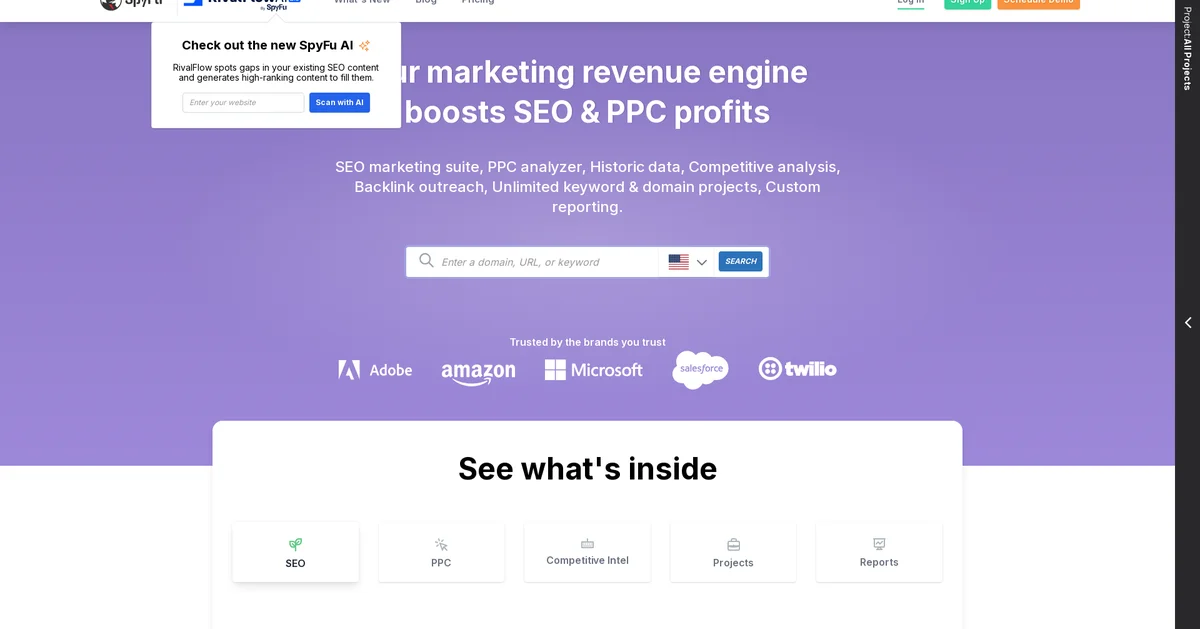
SpyFu delivers both SEO and PPC functionality in a single platform, helping businesses decode their competitors’ online marketing playbook. The tool digs deep into competitor strategies while offering robust keyword research, backlink tracking, and domain performance monitoring. Unlike Moz Pro’s SEO-focused approach, SpyFu takes a broader view by combining search optimization with paid advertising insights, revealing what moves the needle for competing brands.
The platform’s standout RivalFlow feature harnesses AI to identify content gaps and surface promising topic opportunities based on competitor performance data. SpyFu removes typical usage restrictions by offering unlimited keyword and domain tracking across campaigns. Marketing teams can quickly analyze competitor strategies through an intuitive interface that surfaces winning keywords and high-performing ad copy.
The PPC analysis capabilities set SpyFu apart from pure SEO tools. By exposing Google Ads competitors’ keyword choices and historical ad performance, it enables smarter advertising decisions. The platform suggests negative keywords and provides domain-specific recommendations that help optimize campaign targeting and budget allocation.
SpyFu stands as a viable Moz Pro alternative by merging comprehensive SEO and PPC insights into an accessible platform. The addition of RivalFlow and other distinctive features makes it particularly valuable for marketing teams seeking unified digital marketing intelligence.
Pros
- Combined SEO and PPC analysis in a single tool
- RivalFlow AI content optimization
- No limits on keyword or domain tracking
- Detailed competitor intelligence
- Straightforward navigation and reporting
Cons
- Missing some advanced SEO capabilities of Moz Pro
- Limited on-page optimization tools
- Steeper learning curve for beginners
Serpstat
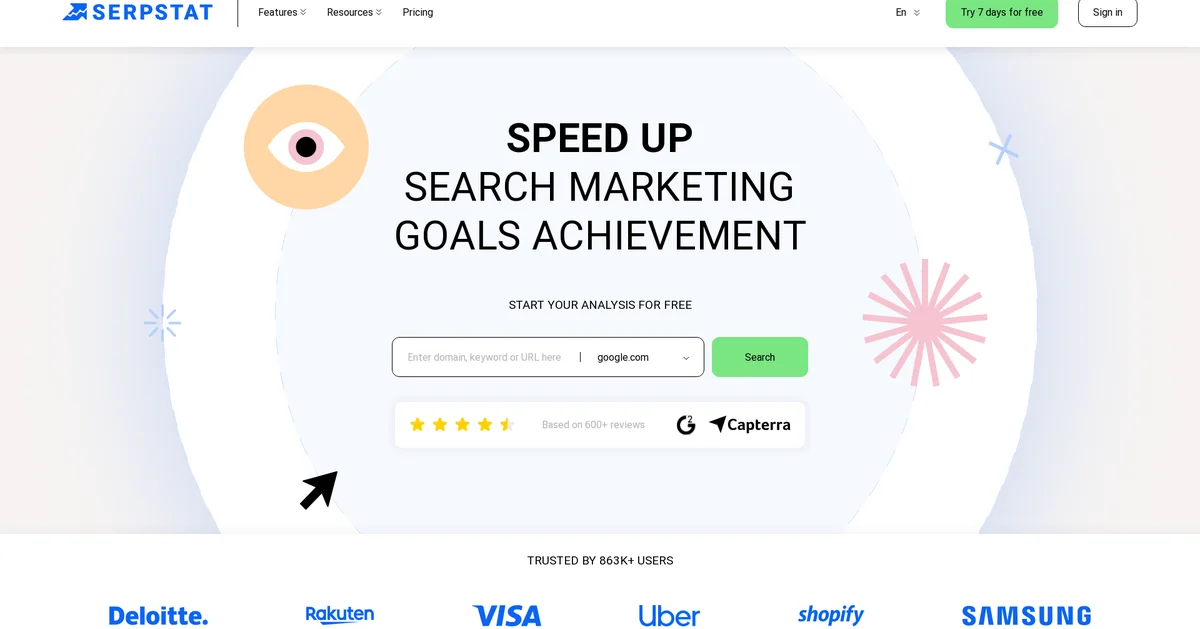
Serpstat has carved out its niche as a solid Moz Pro alternative, bringing comprehensive SEO capabilities to the table. What started as a basic keyword research tool has grown into a full-featured platform that handles everything from performance tracking to competitive analysis. Many businesses find it hits the sweet spot between functionality and ease of use when working to boost their search rankings.
The competitive analysis features really set Serpstat apart from the pack. Marketing teams can extract detailed metrics about their competitors’ traffic sources, examine backlink profiles, and track keyword positions. This level of insight often reveals opportunities that would otherwise stay hidden. The built-in site audit function spots technical problems and delivers actionable fixes, removing the need to hire external SEO expertise.
When it comes to keyword research, Serpstat packs a serious punch. The database spans 230 countries with metrics like search volume, difficulty scores, and cost-per-click data. Marketing teams particularly value this depth when planning PPC spend and content strategy. The platform takes a no-nonsense approach to tracking keyword performance, making it simple to monitor ranking progress without unnecessary complexity.
The clean interface and responsive support team make Serpstat accessible even to SEO newcomers. New users often mention how quickly they got up to speed thanks to the straightforward design and available help resources. Budget-conscious businesses appreciate that Serpstat delivers robust functionality without the premium price tag of some competitors.
Pros
- Deep competitor intelligence tools
- Clean, approachable interface
- Clear site improvement recommendations
- Rich keyword data and tracking
- Budget-friendly pricing tiers
Cons
- Missing some high-end Moz Pro features
- Fewer integration options than alternatives
Mangools
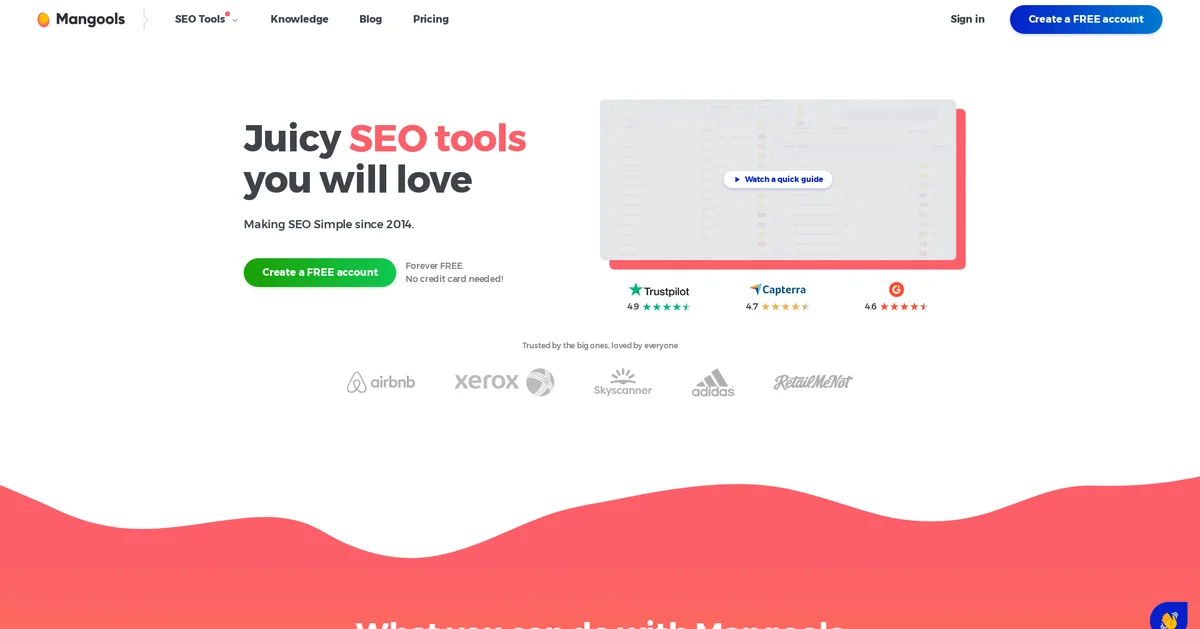
Mangools has carved out its space in the SEO tools market since 2014, focusing on making search optimization accessible and straightforward. The platform strips away unnecessary complexity while maintaining robust functionality that serves both newcomers and experienced marketers.
Their tools deliver practical insights through carefully developed metrics and analytics. The keyword difficulty scoring system stands out by providing concrete data about ranking potential, backed by a performance tracking index that monitors SERP positions. Similarly, their Link Strength measurement cuts through the noise to evaluate backlink quality, giving marketers solid data for building effective link strategies.
The platform’s approachable design removes common friction points in SEO tools. Navigation feels natural, even for those new to technical SEO work. Support comes from active SEO practitioners rather than generic help desk staff, bringing practical knowledge to problem-solving. Their resource library contains straightforward guides that break down core SEO concepts.
Cost-effectiveness remains a key advantage, with plans starting at $29 monthly. This pricing sweet spot delivers essential features without overwhelming users or their budgets, making it particularly suitable for growing businesses and content creators developing their SEO capabilities.
Pros
- Clean, straightforward interface design
- Support team with hands-on SEO experience
- Competitive pricing structure
- Strong keyword research capabilities
- Educational resources included
Cons
- Limited advanced features
- May need supplementary tools for complex campaigns
Majestic
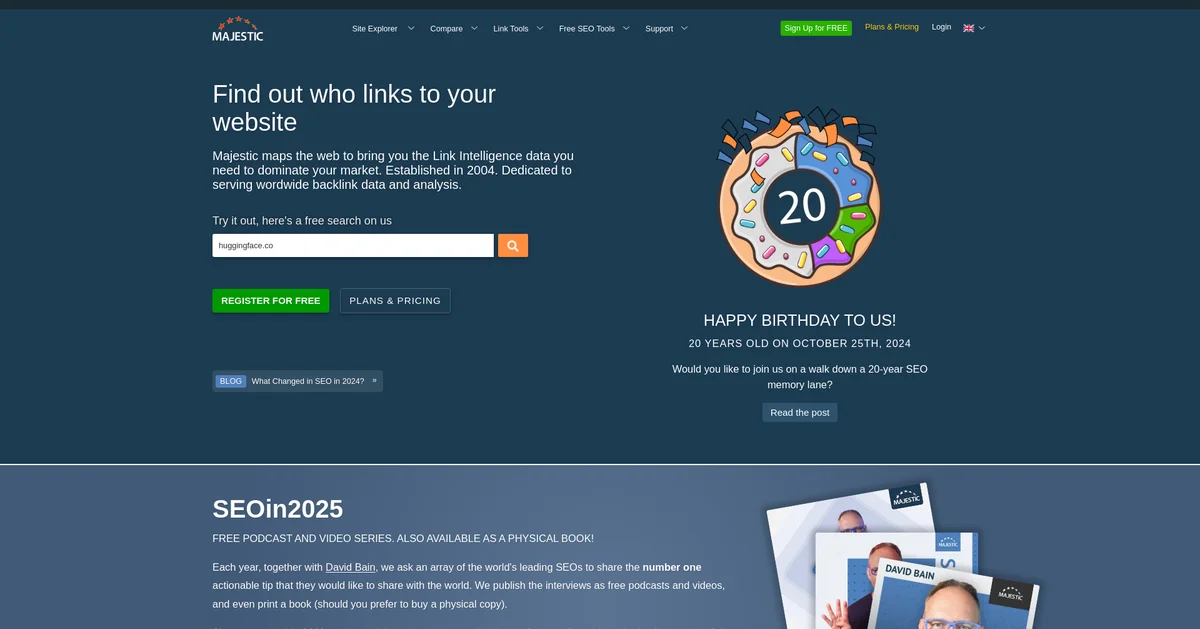
Since 2004, Majestic has carved out its niche in the SEO landscape by focusing on backlink analysis and data. While other platforms try to be all-in-one solutions, Majestic doubles down on link intelligence, making it particularly valuable for teams that prioritize link-building and backlink monitoring.
The platform’s Trust Flow and Citation Flow measurements set it apart from standard backlink tools. These metrics work together - Trust Flow evaluates link quality from trusted sources, while Citation Flow tracks raw link quantities. Majestic also includes Topical Trust Flow, which helps brands understand their authority within specific industry segments and guides content planning.
The Author Explorer feature brings a fresh approach to influencer research and outreach. Beyond basic metrics, it reveals an author’s content performance and social media footprint, giving marketing teams practical data for building relationships with industry voices and content creators.
Data freshness matters in SEO, which is why Majestic maintains two distinct indexes. Their Fresh Index tracks recent link changes within a 120-day window, while the Historic Index maintains records going back to 2006, providing both immediate insights and long-term trend analysis.
Development teams appreciate Majestic’s robust API capabilities, which enable custom integration of backlink data into existing workflows and tools without requiring extensive programming knowledge.
Pros
- Deep backlink analysis through Trust Flow and Citation Flow
- Innovative Author Explorer functionality
- Dual index system for current and historical data
- Developer-friendly API integration
Cons
- Learning curve steeper than some alternatives
- Limited features beyond link analysis
- Higher price points may not suit smaller operations
BrightEdge
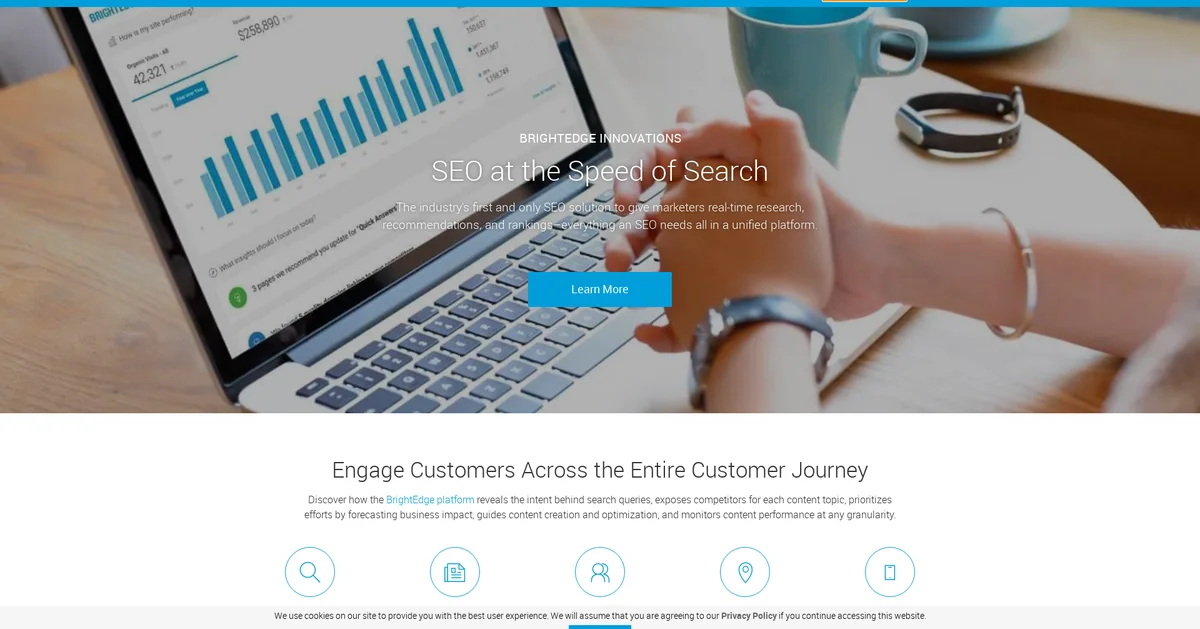
BrightEdge has carved out its own space in the SEO software market, positioning itself as a notable alternative to Moz Pro. The platform emerged from a need for faster, more actionable marketing insights, and has developed into a comprehensive SEO solution that combines research, recommendations, and performance monitoring in a single dashboard.
The platform’s strength lies in its deep analysis of customer behavior and search patterns. By examining user intent data, businesses spot emerging trends and adjust their strategies so. This knowledge drives smarter content decisions and helps brands connect with their audience at crucial touchpoints.
The software bridges digital marketing with brick-and-mortar business needs through targeted content approaches. Organizations with both online and physical locations find particular value in this capability. BrightEdge extends beyond basic SEO to encompass social media management, mobile-first strategies, and location-based optimization, creating a unified marketing approach.
Marketing teams across different roles benefit from the platform’s data-driven tools. The software presents clear metrics on SEO impact and content performance, which proves especially valuable when evaluating campaign success against market competitors.
BrightEdge stands apart from Moz Pro through its emphasis on immediate insights and behavioral analysis. The platform’s broad feature set and integration capabilities make it particularly suitable for enterprises wanting comprehensive digital marketing solutions.
Pros
- Immediate access to performance data
- Deep customer behavior analysis
- Thorough content optimization tools
- Cross-channel marketing integration
- Concrete performance metrics
Cons
- Interface can feel overwhelming
- Premium pricing structure
- Steep initial learning period
Sitebulb
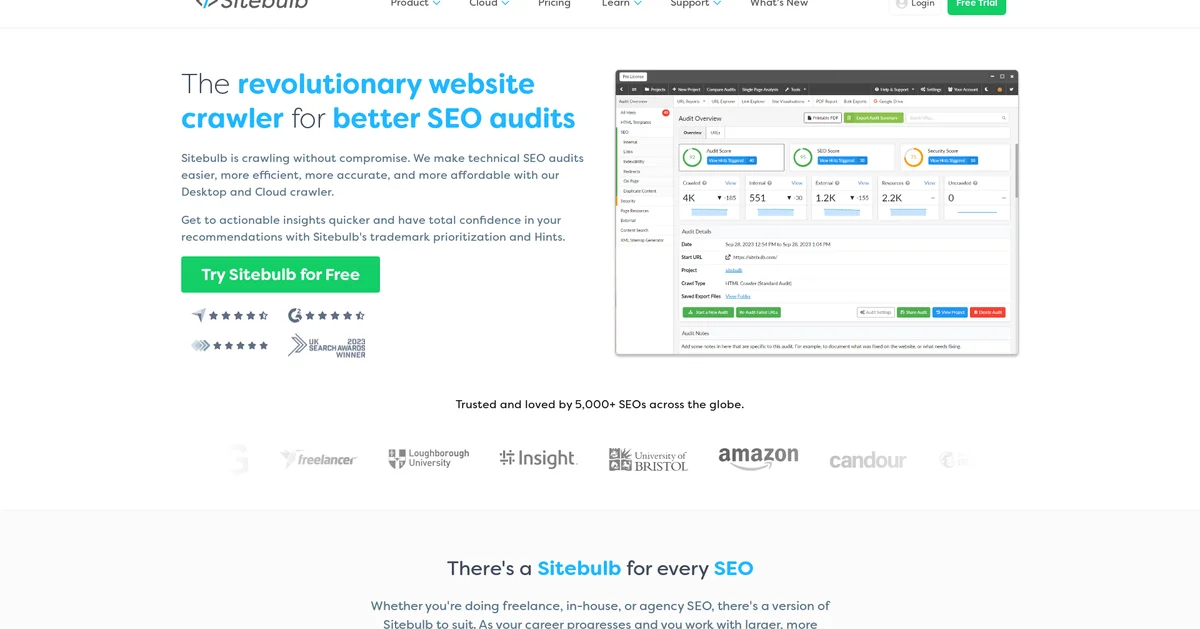
Sitebulb stands as a robust Moz Pro alternative that zeros in on technical SEO audits. The platform has earned strong backing from over 5,000 users globally, thanks to its development by seasoned SEO professionals who understand real-world optimization challenges.
What sets Sitebulb apart is their split approach with Desktop and Cloud versions. The Desktop tool handles thorough audits up to 500,000 URLs, scanning for more than 300 technical issues while presenting findings through clear visualizations that make sense to both experts and clients. Meanwhile, Sitebulb Cloud kicks things up several notches by supporting crawls of up to 10 million URLs right from your browser - perfect for tackling enterprise-level projects where traditional desktop tools fall short.
A notable advantage comes from their built-in “Hints” system, which breaks down complex SEO concepts into actionable insights. This proves especially valuable when explaining technical issues to stakeholders or getting junior team members up to speed. The platform also connects smoothly with Google Analytics and Search Console, streamlining the process of gathering and analyzing performance data.
Though Moz Pro covers more general SEO territory, Sitebulb shines brightest in its laser focus on technical audits and crawl capabilities. Many agencies and independent consultants find the tool’s straightforward pricing and unlimited crawl structure particularly appealing when scaling their client work.
Pros
- Clean interface with practical visualizations
- Flexible Desktop and Cloud options
- Built-in guidance through Hints feature
- Cost-effective with unlimited crawling
- Solid Google tool integration
Cons
- Specialized for technical SEO rather than full-suite capabilities
- More limited feature range compared to Moz Pro
SEO PowerSuite
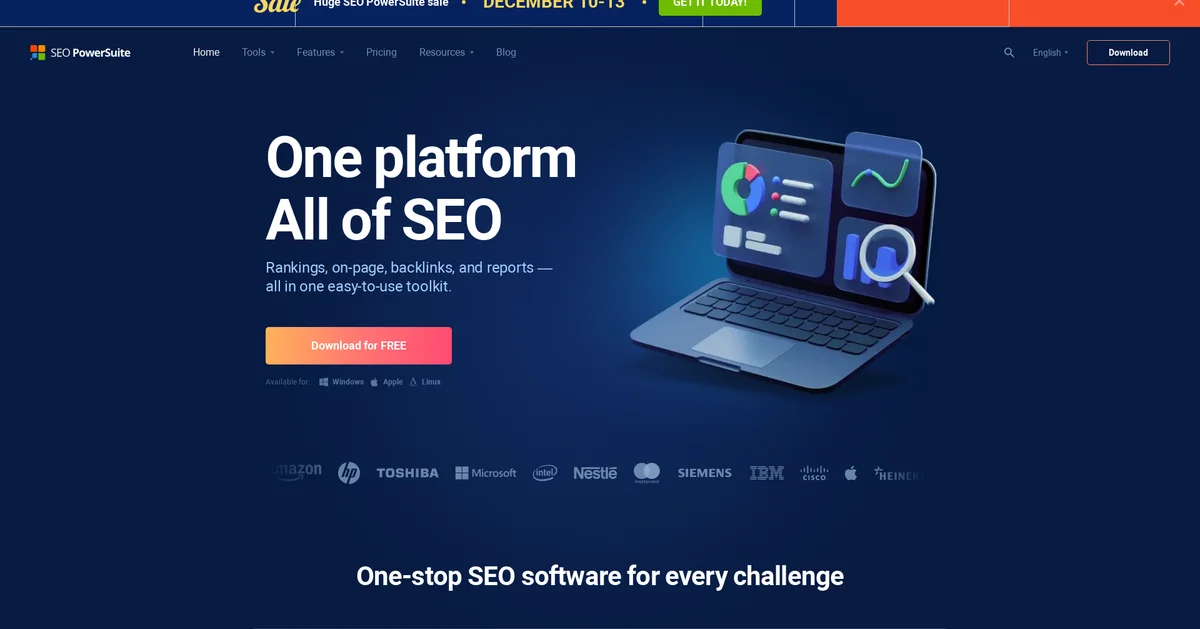
SEO PowerSuite stands as a veteran player in the SEO tools landscape, building its reputation since the early 2000s. The platform combines essential SEO functions - from keyword research and rank monitoring to technical audits and backlink management - into a single ecosystem. This consolidated approach particularly benefits teams tired of managing scattered subscriptions across multiple platforms, while serving everyone from small business operators to enterprise-level SEO teams.
The platform’s data transparency sets it apart from many competitors. Drawing from a massive pool of 6.5 trillion data points and real feedback from its global user base of 2 million, SEO PowerSuite delivers practical, actionable analytics. The core tools - Rank Tracker, WebSite Auditor, LinkAssistant, and SEO SpyGlass - work together seamlessly, streamlining campaign management. New users can download and test the software without financial commitment, making it easier to evaluate the platform’s capabilities firsthand.
For those new to SEO tools, SEO PowerSuite offers an approachable entry point. The transparent pricing model and responsive support team make it more digestible than complex enterprise platforms. Regular updates ensure the toolset stays current with evolving SEO requirements and search engine changes.
In summary, here are some key points:
Pros
- Offers a comprehensive toolkit for all SEO tasks
- Free download with no strings attached
- Trusted data from millions of users worldwide
- Seamless integration of multiple tools
- Straightforward pricing and strong customer support
Cons
- Some features may require more manual input compared to competitors
- A learning curve for complete novices
- Less focus on advanced competitor analysis
If you are interested in Moz Pro, you can learn more with our Moz Pro pricing and Moz Pro alternatives guides.